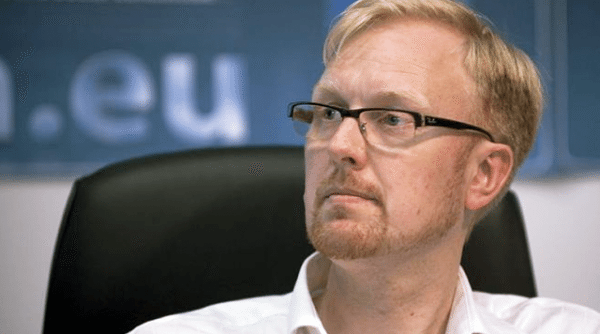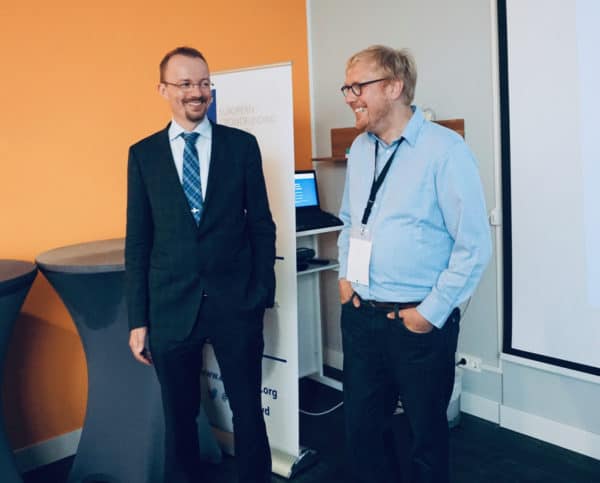The European Crowdfunding Network (ECN) has long been the leading voice advocating on behalf of investment crowdfunding platforms across Europe. The member-driven group has been at the forefront of engaging with policymakers at the European Commission – an initiative that finally paid off when new pan-European crowdfunding rules were announced in late 2019.
Later in 2021, issuers will be able to raise up to €5 million in the European Union leveraging a harmonised regulatory regime. While certain details are still being worked out, it is expected this will become a boon for both issuers and platforms in this sector of Fintech.
Oliver Gajda co-founded ECN in 2012 and went on to establish ECN as an international NGO in 2013 as Executive Director and Chairman of the organization. Recently, Crowdfund Insider connected with Gajda to inquire about the regulatory changes in Europe as well as his expectations for 2021.
Harmonized European crowdfunding rules should have a significant impact on the industry in Europe. What do you anticipate once the new rules become law?
 Oliver Gajda: The harmonised rules for equity and lending based crowdfunding have been in the making for years, but we know that many market actors have not fully comprehended the impact and relevance of these rules. This is why we ran an online event in December with the EC, national conduct authorities and some of our members to foster overall understanding.
Oliver Gajda: The harmonised rules for equity and lending based crowdfunding have been in the making for years, but we know that many market actors have not fully comprehended the impact and relevance of these rules. This is why we ran an online event in December with the EC, national conduct authorities and some of our members to foster overall understanding.
The new rules are clearly designed to reshape the market, enabling more competition and the development of market leaders and stronger professional standards. For the past years, European crowdfunding platforms have largely not shown willingness to proactively work on EU wide best practices, this will no longer be an option.
In those EU Member States where until now no regulation was applied to crowdfunding, this will be the case as of November 2021. This brings more clarity for small investors, especially in those market where there has been potential fraud already, and create new opportunities in those market where no or limited activity has happened until now.
For those Member States where regulation has been applied already, the new rules will replace existing regulatory interpretation at the latest in November 2022 due to a transition period for member states with existing crowdfunding regulation.
Exceptions might survive where regulation is not based on capital markets laws, but we don’t expect them to be significant going forward.
The new rules will provide fertile ground for platforms with a professional background, capital, and the willingness to grow. But this will also mean renewed investment to adapt procedures and professional conduct. We will see increased consolidation, which in some national markets would help create larger actors, and cross border expansion of more platforms, likely the bigger markets first. And we will see new players enter.
Looking back on 2020, it has been a challenging year for everyone due to COVID-19. How have your member platforms performed overall during 2020? What are your expectations for 2021?
 Oliver Gajda: COVID-19 has been a challenge for everybody, indeed. For the crowdfunding sector, overall COVID has, not surprisingly, hurt more of those platforms which had not managed to scale their operations and deal flow sufficiently. Some forms of engagement with clients have been impossible and digital channels have not always been successful in replacing existing person to person approaches. At the same time, investors have become more careful in terms of investing in risky assets and moving their money into alternatives.
Oliver Gajda: COVID-19 has been a challenge for everybody, indeed. For the crowdfunding sector, overall COVID has, not surprisingly, hurt more of those platforms which had not managed to scale their operations and deal flow sufficiently. Some forms of engagement with clients have been impossible and digital channels have not always been successful in replacing existing person to person approaches. At the same time, investors have become more careful in terms of investing in risky assets and moving their money into alternatives.
We expect to see (more) platform closures and a general adaptation to more digital processes. There have also been some actors who were able to maintain and even increase their activity or even create specific actions to help their clients. We also notice that in some markets volumes have increased during 2021 as crowdfunding has been increasingly been able to showcase its advantages in funding small and medium-sized businesses.
We expect COVID to help platforms to refocus and increase competitiveness. But it has and will further speed up the consolidation of the market.
Do you anticipate any negative impact from Brexit?
Oliver Gajda: It is too early to say how Brexit will impact the market. Most European platforms did not operate cross border and of those that did, many have relevant contingency plans, for example, subsidiaries that will be able to carry out relevant activities in the UK or in Europe.
There may also be withdrawal from respective foreign markets by platforms, such as Funding Circle’s 2020 strategic decision to refocus on the UK market. Since the current Brexit deal does not cover services, we should, however, expect a decline in cross border funds between the UK and the EU. For everything else, we need to wait for how the two markets will develop alongside and under the new EU crowdfunding regulation.
In the US, we are seeing some consolidation of platforms. Do you anticipate more combinations in Europe?
Oliver Gajda: Yes, consolidation has already started with a number of mergers in the past years and we expect more to come.
The industry has in parts not managed to scale operations over the past years. Mergers like the CrowdCube and Seedrs deal in the UK will set the pace for the rest of the UK. But it will also impact the EU markets, as both platforms have maintained a strong interest in the EU.
In the EU markets, mergers have not had the same scale, but as in the 2019 case of Invesdor (Finland) merging with Finnest (Austria), the focus on expanding cross border is also thought to lead to a relevant advantage under the new EU regulation.
There are ongoing discussions about collaborations between different platforms and we believe that COVID might speed up some of them, but the main driver will be the new harmonised regulation as of late 2021.
It remains unclear if the market will continue to upscale, such as UK consumer peer-to-peer lender Zopa, which received its bank license in 2020, under the new EU regulatory rules, or if we will see more downscaling or even acquisitions of platforms by banks or other financial service providers.
The relevant targets in the EU are still limited and we might need to experience first clear market leaders to evolve in the EU.
And what about digital assets (or crypto-assets). What are your thoughts on MiCAR? Some people believe the current wording falls short.
Oliver Gajda: There has been lots of interest in crypto assets over the past years, but largely not by established crowdfunding platforms.
Today, it remains difficult to trade securities as crypto-assets across Europe, though in some Member States relevant opportunities have been created and some crowdfunding platforms are testing these.
The rules for the use of distributed ledger technologies are rudimentary at best, for now, we published a study on this together with Dentons, the law firm. Nevertheless, as crowdfunding is now being regulated as a financial service, and MiCAR purposefully leaves out financial service, it is initially not of interest to most equity or lending actors. Plus, the MiCAR proposal by the Commission will surely change during the political discourse within the European context and we will monitor how this will change in due course.
Are most platforms preparing to digitize securities?
Oliver Gajda: For now, this is not an issue as MiCAR is still in the drafting process within the policy context of the European institutions. We expect relevant changes to the draft text over the next months and years before it will be finalised.
Nonetheless, there have been, of course, numerous attempts to digitise crowdfunding transactions. We need to be careful however and understand that there are different models at play across the EU, with some platforms operating outside of financial market supervision – and therefore able to exploit opportunities within crypto-assets – and others, which operate under financial market supervision, only being able to exploit crypto assets or distribute ledger technologies within the possibilities of the national laws.
We expect a lot of discussion with some of our members, but no clarity on how the rules will look in the end for some time and how they might create opportunities for our sector.
What are the top policy initiatives for the ECN for 2021?
Oliver Gajda: With regard to the new crowdfunding regulation, ECSP, we expect the European Security Markets Authorities to publish a public consultation on their work regarding the outstanding regulatory technical standards which will help Member States with the implementation of the new rules.
As the EU has left some aspects of the implementation to the Member States, this will be important to follow in order to ensure that the market has relevant access to information to prepare. MiCAR will also remain in our focal point over the next years, this is underlined by our ongoing cooperation with INATBA.
On the other hand, we initiated a while back the discussion that crowdfunding could be used to help distribute European structural funds and have already provided structured input to the European Commission, the European Parliament, and the European Investment Bank. We are continuing to support this activity and expect to publish a further study in the first quarter of 2021. This topic will certainly stay with us for some time.
 In 2021, will ECN announce any new partnerships? New Initiatives?
In 2021, will ECN announce any new partnerships? New Initiatives?
Oliver Gajda: With regard to our national activities around knowledge creation and education, we have now a strong presence in Italy and Spain, in the latter, we will launch our full activities this year, as well as first cooperating with EU agencies such as the European Intellectual Property Office. We have already started to explore opportunities for replication in other national markets and hope to launch one or two more in 2021.
We have also a keen interest to roll out our academic cooperation and are in close discussions with first partners. However, it is too early to be able to disclose full partnerships though we have already developed good connections with potential partners in the EU, the UK, and the USA. We are aware that this market operates differently than we and we are patient in our efforts.
With the new regulation approaching soon, there will also be a need for a comprehensive standard of best practices, data provision, and transparency toward consumers – three areas the industry has largely failed to adequately address over the past years.
For us, this means also to reflect with our members on our own position, goals, and role within the market. We have started to redesign our approach and hope to be able to adjust our positioning in order to continue to help the sector to mature within our newly harmonised market.




